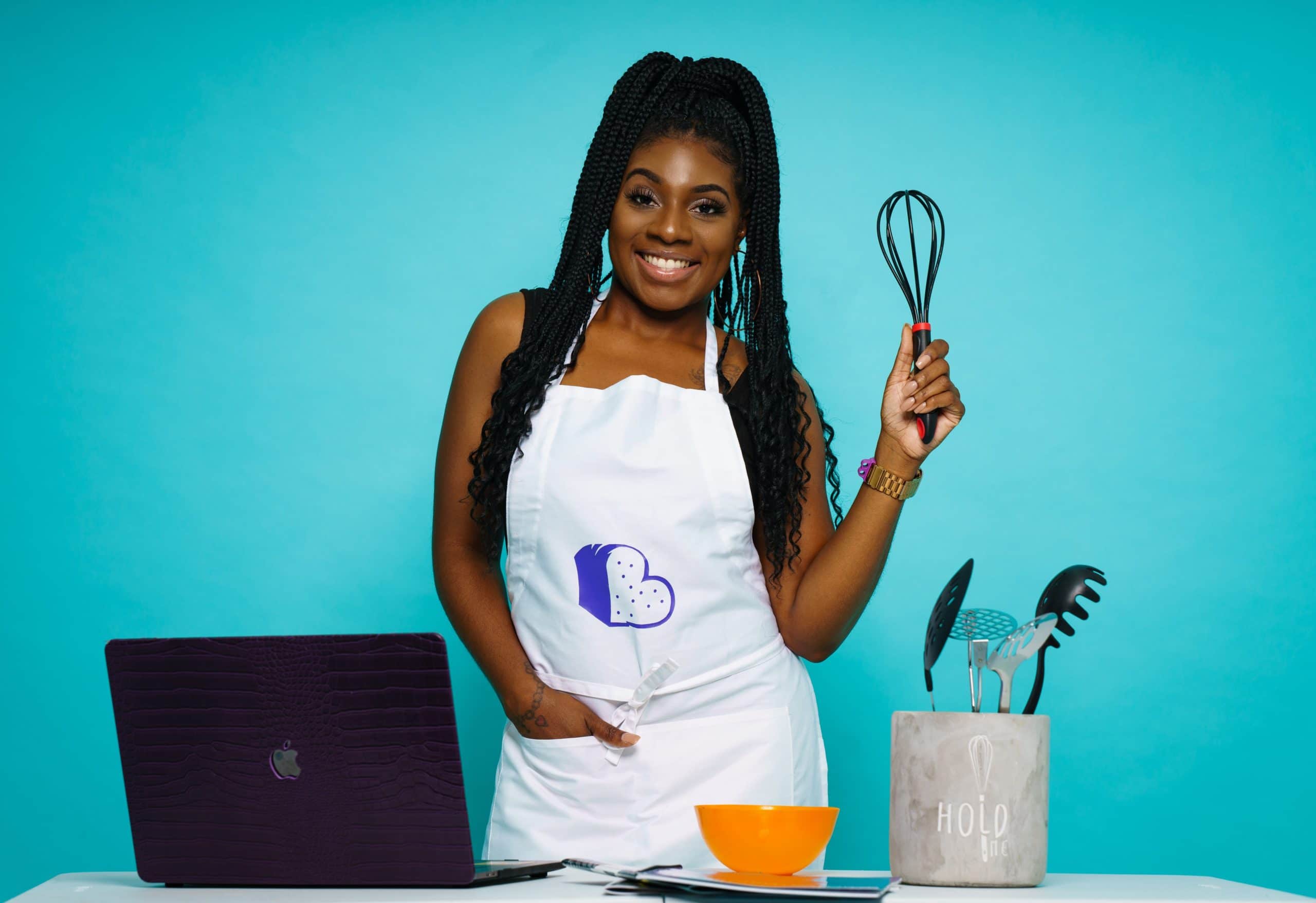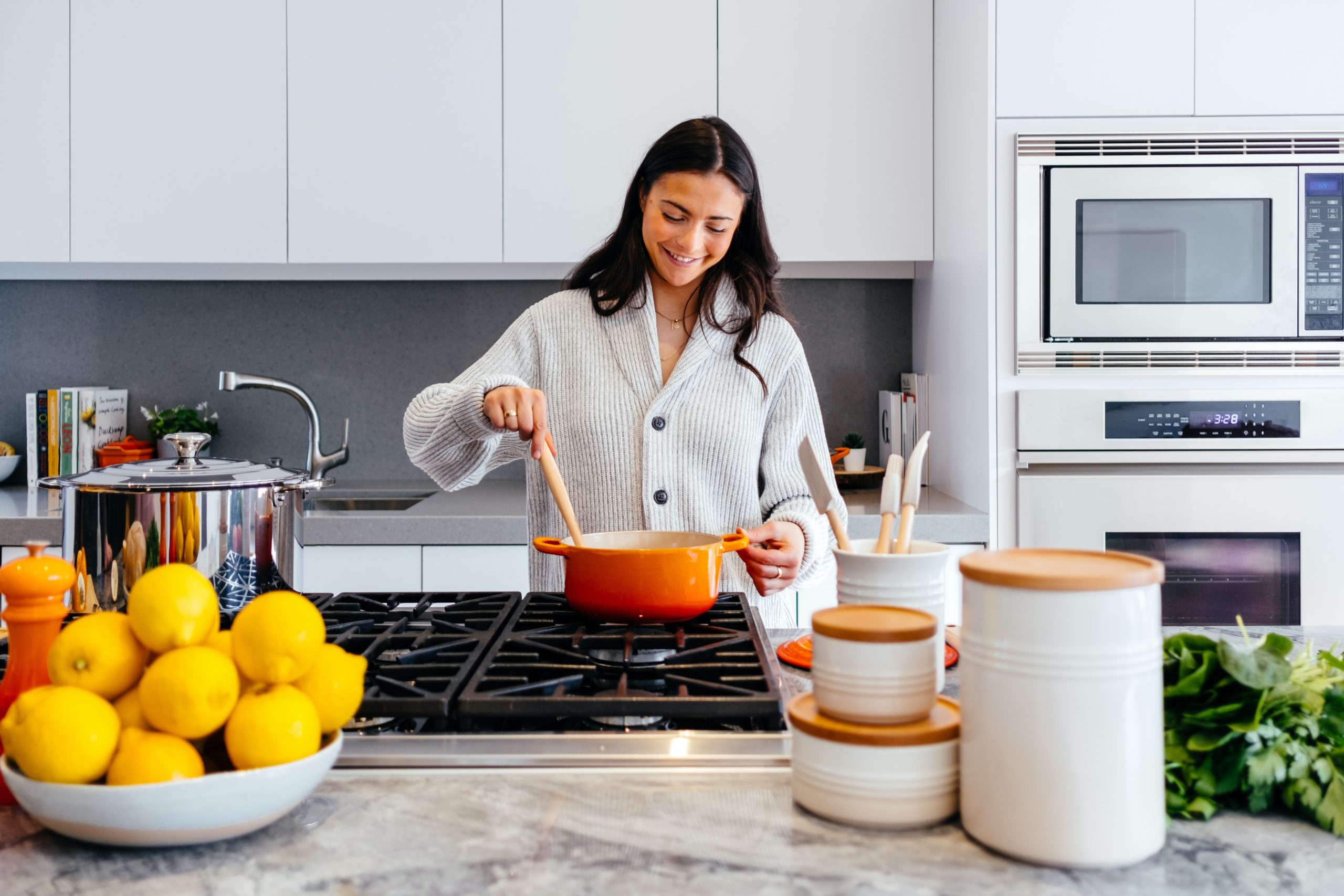Would you believe if we mentioned that the culinary tourism market is set to grow to $1,796.5 billion in valuation by 2027?
Now, you must be here thinking, “What has culinary tourism got to do with me starting a cooking class business?”
It is also depictive that people are interested in knowing and investing in diverse cuisines, especially international cuisines.
If you have a passion for cooking and you know your basic ways around handling a camera and posting things online, the chances are that the cooking class business could be a life-changing gig for you.
Starting something is never easy or a linear process. It is all about the hustle and implementing the right strategies.
It doesn’t matter whether you are a professional chef looking for a side hustle or you are a home cook trying to teach the basics about winging comforting cooking at home; anybody can start their own cooking class business in 2025.
The only thing? You need to know the ropes.
And, while starting your cooking class can seem a little too easy after that intro, we hate to break it to you, but you need a little prep going into it.
Don’t worry though, because that’s what we are here for. Our article includes all the essential pointers you need to know before starting your cooking class business online.
- Also Read: How to make money teaching online?
Is the Cooking Class Business the Right Choice for You?
Any business will only ever amount to anything if you consistently invest your time and efforts into it.
You can’t necessarily expect everything to be smooth sailing right off the bat. Instead, you need to tally out the good and the bad associated with the business model.
Let us walk you through a few of them:
Advantages Of Started A Cooking Class Business
Here are 3 best pros of starting your own cooking business:
1. Flexible work model
One of the most significant benefits of starting your own cooking class business is having full reign over the process.
You can work full-time and invest your time, money, and knowledge in work, or you can hire or outsource the job and then integrate the same into your business. The decision is in your court.
It allows you to start on your own and expand later, or you can start with a team of people who share the same passion for cooking as you do.
2. Start remotely
You won’t know how viable a cooking class business is until you do it. And, the best part? You don’t even need a separate office space to get your business started. If you aren’t a people person and want to explore new opportunities from the comfort of your own home, this is your chance.
3. Work satisfaction
Some people are genuinely passionate about food and love cooking and exploring new cuisines. Starting a cooking class business allows you to explore that aspect intricately.
Disadvantages About Cooking Class Business
Here are 3 cons of starting your own cooking business:
1. Prep Work
Starting your own business comes with its fair share of downsides.
For a cooking class business, you need to be on top of the game when sourcing the ingredients and keeping track of the inventory.
You need to ensure you have all the resources for the cooking, be it the raw materials or the cooking utensils.
2. High Investment
Overhead costs are predominant with these kinds of online businesses. Not just for the supplies but also the right online platform and even the allied network costs that come with streaming the classes.
3. Saturated Market
Although everyone’s style of cooking and teaching is going to be different, don’t be surprised when you are faced with a lot of competition in the market.
So, before you tap into this niche, invest your time researching the market and the demand.
How Much Can You Earn from A Cooking Business?
With any business model, the end goal is to focus on revenue.
Every entrepreneur wants to develop a successful business that churns in profits for them annually.
While several successful cooking class businesses like Hipcooks bring in $1.2 million in profits every year, some businesses have just started.
As a business model, before considering the overall revenue, you need to sort out the setup and recurring costs you will have to bear to run the business successfully.
For your convenience, we have broken down the salient expenses that you will have to bear when you start your cooking class business.
9 Expenses To Cover For Your Business
Here are some of the expenses that you will require to bear in order to run your business:
1. Rent for office space
This will involve the rent required to start your cooking class. Keep in mind that while you might not need a rental space if you are teaching online, you will have to consider getting one if your cooking class business will be conducted offline.
The rental cost will vary depending on the country you stay in.
2. Utility cost
This will include the necessary utility expenses, including electricity, water, gas, and the other associated costs.
3. Kitchen resources and supplies
These will include the primary set-up cost, including the kitchen utensils, appliances, and the necessary cooking equipment that you’d need to teach a class of students offline.
The expenses will be more with an offline class since you will need multiples of each appliance and utensils to distribute equally.
4. Payroll
This expense will include salaries for any appointed team member or any freelancer you might be working with. Sometimes, some business professionals even put themselves on payroll and get a fixed salary every month.
5. Technology equipment
Another considerable expense that will cut out from your investment is the required technology and technical equipment. It might include laptops, cameras, ring lights, backdrops, etc.
6. Website investments
For the ones wanting to have an online outreach for their cooking class business, you will need to consider setting up a website.
These investments will include domain, web hosting, content management system, web designing, web development, email hosting, and a few extra tidbits.
If you are looking to start your online cooking class business, try out Mastera to manage all your digital infrastructure requirements.
7. Permit and License fees
Starting your business requires you to have a trade license. The cost will depend on the country you are based in and the kind of licenses that you’d need. You might have to consider getting professional legal help in that case.
8. Insurance
Not every business owner wants to focus on this. As a small business owner, especially for cooking classes, getting the proper insurance is crucial to staying safe and secure.
9. Marketing expenses
You can’t expect to reel in interested students if no one even knows about your cooking class business.
So, setting aside a budget for marketing, both online and offline, is necessary.
These are some of the most common expenses that you’d have to consider bearing when starting your cooking class business. However, keep in mind that these are all subjective, and the rates and expenses will vary from one entrepreneur to the other.
In general, the start-up costs depending on the above pointers can range between $1,500 to $30,000, providing that we have kept both ends of the deals in mind.
How Can You Raise Money for Your Cooking Class Business?
If you are ready with a business plan but don’t have enough capital to invest, there are a few ways you can raise money to cover the costs. Some of them include:
- Talk to a bank for credits or a loan
- Reel in investors from your friends or family circle
- Find angel investors who are looking for small businesses to support
Once you have all the expenses calculated and the investments sorted, it will become a lot easier for you to price your classes to reel in good profits for your investments. We will talk about this in the later section of the article, so read till the end.
How to Start A Cooking Class Business? [11 Easy Steps]
Now that we have sorted out the basic understanding of the cooking class business and the investments associated with the same, the next thing to do is develop a viable business plan.
Keep in mind that having a structured plan and strategy is the key to a successful business, so you can’t slag on that.
Here’s a comprehensive breakdown of each step that you need to implement for starting a successful cooking class business:
1. Sit down and Reiterate
Often, we rush into an idea and try to make it a reality, not even realizing whether we are ready for that responsibility or not.
So, before making any major decision, sit down and think. You need to think about the types of cooking you are good with and whether you are passionate enough to pursue this as a business model.
Also, consider whether you want to do this on a long-term basis or settle this into a one-time class.
If you are considering doing it for a long term, you will have to look into ways to keep a constant flow of students to your cooking class, which is another headache that requires a proper marketing brain.
2. Sort out the Licenses and Permits
Once you are ready with the idea and have decided to move ahead with the plan, you need to research the trade licenses and permits that you’d need to start your business.
Getting legal documentation is required to validate your business model, especially if you have a bigger goal for it.
While you might not need a proper license or permit to teach cooking tutorials online, you might have to consider getting them if you are renting out an office space and have students coming in real-time to learn from you.
We’d recommend getting a lawyer to sort this out for you.
3. Conduct Market Research
The cooking class business is not a unique business model.
There are hundreds of cooking tutorials and business models that are already available online and even offline. So, what makes your business plan stand out and good enough to reel in students?
What do you offer that other cooking classes won’t?
To answer that question, you need to conduct thorough market research and analysis.
Not only will it get you an idea about the ropes involves in running a successful cooking class business, but it will also help you get a better understanding of the demands and shortages in the market that you can fill in.
Try to learn about cooking skills that people are willing to learn, but there are shortages of cooking classes teaching the same. This way, you can tap into it and bridge the gap.
4. Signify the Type
There are two types – the general cooking classes and the technical cooking classes. With the general cooking classes, you get to teach about the basics of cooking while the technical ones focus on a specific cuisine or skill.
So, before starting your business, you need to establish which niche you want your classes to be focused on.
5. Define Your Goals
Idealizing a business plan isn’t the end goal. You need to sit down and think about what you want to do next and in a bigger picture.
Do you want to conduct monthly cooking classes? Do you want to do it for a few months and then see about expanding it?
What are your goals with the business?
Do you have the time to pursue this as a side hustle, or do you want to do it full-time?
Having a clear vision of the objective helps you navigate through the situation a lot better than you’d expect or imagine.
6. Worry about Finances
One of the biggest factors to starting your cooking class business in 2025 is to think about the start-up costs.
If you are passionate about pursuing this as a serious side project or a full-time project, you need to start budgeting now or develop other plans to arrange for the initial investments.
Whatever it is, be ready to hash out quite a good chunk of money from your pocket because setting up a cooking class business is no joke.
Even if you start with meager online classes and tutorials, you need to spruce up your kitchen, upgrade the appliances, invest in good equipment and have an attractive presence in front of the camera to be persuasive enough to reel in some students to your class.
And, all of these require proper financing. So, sort that out with someone who has a good idea about finances and budgeting.
7. Consider a Facility
Okay, this is a hit or miss.
Most of the people who start their cooking classes generally prefer beginning from their home kitchen. In that case, you wouldn’t have to worry about spending extra cash on renting a space or a commercial kitchen.
However, if you want to start big and have a good chunk of students already interested in joining your class, you might have to consider talking to the owners of a suitable facility that you will rent out for the classes.
We wouldn’t suggest buying a facility right off the bat, especially with how unstable the future is.
If you have a higher spending limit, you can rent an open space and then get it custom-made for your cooking classes.
8. Focus on Getting the right Equipment
Cooking classes are based on your kitchen essentials.
So, before starting your business, you need to sort out the requirements. Make a list of all the kitchen items that you’d need before starting your business.
It can include your general kitchen utensils like bowls, spoons, etc., and it can also have bigger investments like an oven, microwave, etc.
So, plan so you can focus on either getting facilities equipped and furnished with this equipment, or you might have to source them out of your pocket.
9. Emphasize on Marketing
With thousands of available online and offline cooking classes, nobody will know about yours until you market them to the target audience.
Marketing is crucial to ensure a steady inflow of attendants or students to your class to keep your business on the top of the game.
The first step to a fruitful marketing campaign is to set up a well-designed website with all the necessary information about the class.
Highlight the pointers about your class and the advantages that the students will get to experience out of it. If possible, include high-resolution images in the website to showcase dishes and the meals that the students can learn to cook.
Leverage the power of social media for marketing and promotion.
With the right tools and strategies, you wouldn’t have difficulty reaching the right spectrum of audiences. If you aren’t qualified to do the marketing, outsource the work to a professional who is.
Must Read: How to get your first 100 customers
10. Research about the Ideal Platform
For online cooking classes, you need to decide what platform you will release your classes on. While YouTube is a viable channel, it is a free platform that won’t bring you a lot in revenue, especially for the kind of investments you make.
Instead, avail a video platform that is private, exclusive, and is integrated with all the advanced features that you’d need to publish the video, process payments, and even have separate sections for reviews and ratings.
11. Keep a Positive Outlook
Business models aren’t always profitable, and that is something that you need to make yourself ready for. Just because you have a fantastic idea up in your head doesn’t necessarily mean that you will be able to witness rightful results right off the bat.
So, instead of giving up, you need to tweak your strategies and experiment with new ideas to attract more students to your class.
Students will only interact with cooking classes that are interactive and fun, so focus on keeping up a positive outlook throughout the journey.
How to Price Your Cooking Class Business?
One of the most challenging issues while starting a cooking class business is to set the pricing for each course or class. Some cooking classes charge per class, while some charge for an entire advanced or technical cooking course.
If you are confident with your skills and teaching, avoid underpricing your classes. However, there is no point in overpricing the classes too.
Ideally, the charges levied by you will be subjective to your business model and will depend on the following factors:
1. Determine your costs
Before deciding the price for your classes, you need to sit down and determine how much you are spending on starting your business.
Once you tally all your fixed and recurring costs, you can then go ahead and create a spreadsheet to note them down.
Keep a separate section for the number of students you have to determine how much you’d have to charge to keep the business profitable.
2. Ascertain your revenue goals
When setting your prices for the classes, you need to create revenue goals and profit that you want to channel in for your business.
The best way to do that is by ensuring that you sort out your expenditure first and then estimate the price per product to meet your revenue goals for a profitable business plan.
3. Look into your competitors
Sometimes, copying your competitor’s business model can help propel your business.
Doing a competitor analysis can help you get an idea about the current prices that they are charging for each class or project. Compare the prices and their business models before establishing your price chart for your business.
FAQs About Starting a Cooking Class Business
How much should you charge for a cooking class?
There is no standard price for a cooking class. It is subjective to your needs, it will vary depending on the cooking skill you are teaching, the kind of investments you have made, and the kind of profits you want to make from the business.
How do you do a cooking class?
Starting a cooking class business requires comprehensive planning, setting up start-up costs, and delegating the kind of profits you want to channel in.
Can I give cooking classes at home?
Yes, definitely. If you have a well-equipped kitchen at home with a smaller batch of students, in the beginning, you can quickly start the cooking class business at home. Once you expand your business model, you can think about renting out a place.
How do online cooking classes work?
If you are thinking of starting an online business, you can start by finding the right platform for the same. Once you have the website set up, you can quickly sort out the class modules, payments, and reviews for the classes.
Conclusion: Ready To Start You Own Cooking Class Business?
Starting a successful cooking class business is never an easy or linear process.
Not only do you need to plan, but you also need to consider a lot.
Start by clarifying your business goals, structure, and planning before you consider launching the business. You want your cooking class to address the demands that the potential students are looking for.
The key to establishing a successful business is to make your cooking class unique, fun, and a positive environment to be in.
Include value in your class, mainly to satisfy the students and refer your classes to their friends and family.
To launch your online cooking class business, sign up on Mastera for Free.







